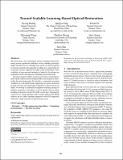| dc.contributor.author | Huang, Siyong | |
| dc.contributor.author | Song, Qingyu | |
| dc.contributor.author | Yu, Kexin | |
| dc.contributor.author | Wang, Zhaoning | |
| dc.contributor.author | Zhong, Zhizhen | |
| dc.contributor.author | Xiang, Qiao | |
| dc.contributor.author | Shu, Jiwu | |
| dc.date.accessioned | 2025-09-11T20:42:30Z | |
| dc.date.available | 2025-09-11T20:42:30Z | |
| dc.date.issued | 2025-08-06 | |
| dc.identifier.isbn | 979-8-4007-1401-6 | |
| dc.identifier.uri | https://hdl.handle.net/1721.1/162649 | |
| dc.description | APNET 2025, Shang Hai, China | en_US |
| dc.description.abstract | The increasing scale and dynamic nature of modern optical networks present significant challenges to the scalability and adaptability of fault recovery. Existing state-of-the-art (SOTA) optical restoration methods rely primarily on offline pre-computation for each fault scenario, followed by online traffic reallocation. Their scalability to large network topologies is limited by the reliance on traditional solvers and imprecise modeling of potential faults.
This paper proposes LBOR, an optical restoration system built on multi-agent reinforcement learning (MARL) and integrated with a traffic allocation framework. We introduce a sequential restoration workflow for each failed IP link, employing two agents dedicated to path selection and wavelength assignment, respectively. In addition, we develop a randomized assignment ordering strategy to mitigate premature convergence to local optima and an action masking mechanism to prune the MARL search space. Experiments conducted on a large topology with 70 nodes indicate that LBOR achieves up to a 1000 × speedup compared to the SOTA approach, with only a slight reduction in allocation precision. | en_US |
| dc.publisher | ACM|9th Asia-Pacific Workshop on Networking | en_US |
| dc.relation.isversionof | https://doi.org/10.1145/3735358.3735370 | en_US |
| dc.rights | Creative Commons Attribution | en_US |
| dc.rights.uri | https://creativecommons.org/licenses/by/4.0/ | en_US |
| dc.source | Association for Computing Machinery | en_US |
| dc.title | Toward Scalable Learning-Based Optical Restoration | en_US |
| dc.type | Article | en_US |
| dc.identifier.citation | Siyong Huang, Qingyu Song, Kexin Yu, Zhaoning Wang, Zhizhen Zhong, Qiao Xiang, and Jiwu Shu. 2025. Toward Scalable Learning-Based Optical Restoration. In Proceedings of the 9th Asia-Pacific Workshop on Networking (APNET '25). Association for Computing Machinery, New York, NY, USA, 200–206. | en_US |
| dc.contributor.department | Massachusetts Institute of Technology. Computer Science and Artificial Intelligence Laboratory | en_US |
| dc.identifier.mitlicense | PUBLISHER_CC | |
| dc.eprint.version | Final published version | en_US |
| dc.type.uri | http://purl.org/eprint/type/ConferencePaper | en_US |
| eprint.status | http://purl.org/eprint/status/NonPeerReviewed | en_US |
| dc.date.updated | 2025-09-01T07:55:42Z | |
| dc.language.rfc3066 | en | |
| dc.rights.holder | The author(s) | |
| dspace.date.submission | 2025-09-01T07:55:43Z | |
| mit.license | PUBLISHER_CC | |
| mit.metadata.status | Authority Work and Publication Information Needed | en_US |
